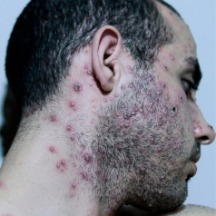The U.S. Centers for Disease Control and Prevention (CDC) reports that more than 5,000 monkeypox cases have been reported from 51 countries that don’t normally report the disease. Typically, the disease is found in portions of central and west Africa where health authorities are reporting a higher number of cases this year over the last.
Most of the monkeypox cases in the United States have been reported in New York, California, Illinois, Florida, and Washington, DC. Two vaccines are available to protect people against monkeypox, Jynneos and ACAM2000. Federal officials are focused on prioritizing providing Jynneos, given in two doses 28 days apart, because it has fewer side effects and can be administered to people who are immunocompromised, which ACAM2000 cannot. The Biden administration rolled out a strategy in late June to expand vaccinations.
"Monkeypox virus is essentially transmitted by skin-to-skin transmission. That is very different than the transmission of HIV.”
-
Theo W. Hodge, Jr., MD, Medical Director of the Washington Health Institute
When DC opened a limited number of vaccine appointments to a select population of residents, 300 slots were filled in 15 minutes. The vaccine appointments are available to anyone over the age of 18, who consider themselves:
Gay, bisexual, and other men 18 and older who have sex with men and have had multiple or anonymous sexual partners in the last 14 days; or
Transgender women and nonbinary persons assigned male at birth who have sex with men; or
Sex workers (of any sex); or
Staff (of any sex) at establishments where sexual activity occurs (e.g., bathhouses, saunas, sex clubs).
In Africa, the World Health Organization (WHO) says that according to detailed data from Ghana, monkeypox cases were almost evenly split between men and women, and no spread has been detected among men who have sex with men. In Europe, 99 percent of the cases have been in men – the majority in men that have sex with men. WHO also estimates that Europeans now represents 90 percent of the world’s monkeypox cases.
Monkeypox Spreads in US, Vaccine Limited, is it Like HIV?
Health


Statistics picturing the spread on monkeypox as heterosexual in Africa, but gay in the rest of the world is reminiscent of the spread of HIV. Theo W. Hodge, Jr., MD, Medical Director of the Washington Health Institute in Washington, DC, explained, “Certainly, the notation of women in Africa versus men who have sex with Men (MSM) in Europe and the USA is reminiscent of the HIV epidemic. That is where it stops. Monkeypox virus is essentially transmitted by skin-to-skin transmission. That is very different than the transmission of HIV.”
Health officials have warned people to learn from the HIV and COVID epidemics. DaShawn Usher, of the LGBTQ+ advocacy organization GLAAD, told Newsweek, "Health reporting should always lead with facts and science, and not single out groups of people based on who they are. As we learned with HIV and with COVID, misinformation spreads infection amongst groups that believe they are not at risk, leads to dangerous silencing and shaming, and harms public health."
Monkeypox is in the same family of viruses as smallpox, and smallpox vaccines are estimated to be about 85% effective against monkeypox, according to WHO. The CDC reports that in humans the symptoms of monkeypox are similar to but milder than the symptoms of smallpox. Monkeypox begins with fever, headache, muscle aches, and exhaustion. The main difference between symptoms of smallpox and monkeypox is that monkeypox causes lymph nodes to swell (lymphadenopathy) while smallpox does not. The incubation period (time from infection to symptoms) for monkeypox is usually 7−14 days but can range from 5−21 days.
Dr. Hodge added, “I suppose that if one's immune system was severely compromised by HIV, monkeypox could present in an exaggerated fashion (profound rash, persistent fevers or chills).”
However, he also gave hope for those who are HIV-positive, but undetectable via medications. “Being undetectable would make it more likely that one’s immune system is relatively intact (rather than suppressed). Being undetectable would make it less likely that monkeypox would cause greater illness. “
From Our Archives: Monkeypox Virus Disparities: Here We Go Again
Health officials have warned people to learn from the HIV and COVID epidemics. DaShawn Usher, of the LGBTQ+ advocacy organization GLAAD, told Newsweek, "Health reporting should always lead with facts and science, and not single out groups of people based on who they are. As we learned with HIV and with COVID, misinformation spreads infection amongst groups that believe they are not at risk, leads to dangerous silencing and shaming, and harms public health."
Monkeypox is in the same family of viruses as smallpox, and smallpox vaccines are estimated to be about 85% effective against monkeypox, according to WHO. The CDC reports that in humans the symptoms of monkeypox are similar to but milder than the symptoms of smallpox. Monkeypox begins with fever, headache, muscle aches, and exhaustion. The main difference between symptoms of smallpox and monkeypox is that monkeypox causes lymph nodes to swell (lymphadenopathy) while smallpox does not. The incubation period (time from infection to symptoms) for monkeypox is usually 7−14 days but can range from 5−21 days.
Dr. Hodge added, “I suppose that if one's immune system was severely compromised by HIV, monkeypox could present in an exaggerated fashion (profound rash, persistent fevers or chills).”
However, he also gave hope for those who are HIV-positive, but undetectable via medications. “Being undetectable would make it more likely that one’s immune system is relatively intact (rather than suppressed). Being undetectable would make it less likely that monkeypox would cause greater illness. “
From Our Archives: Monkeypox Virus Disparities: Here We Go Again
Advertisers | Contact Us | Events | Links | Media Kit | Our Company | Payments Pier
Press Room | Print Cover Stories Archives | Electronic Issues and Talk Radio Archives | Writer's Guidelines






